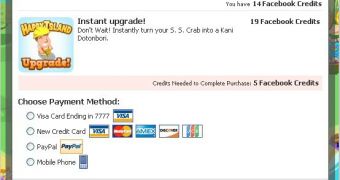Facebook may be huge, but it's still feeling its way when it comes to revenue. It's bringing in a significant amount of money at this point, though the company doesn't say how much, but nothing in the range of what its huge user base would provide. One area that looks rather promising is virtual currency and micro-payments, something that has proven very lucrative for some third-party developers on Facebook. The social network has been looking to capitalize on that and launched the Facebook Credits program last year in a limited test. The program is slowly rolling out to more developers and Facebook has decided to reveal that its cut out of every transaction is of 30 percent.
"As we move into the beta phase of program, we want to provide an update about Facebook Credits. Over the past several months we have added several of the largest developers, including Crowdstar, Playdom, Playfish, RockYou, 6waves, and Zynga, into the Facebook Credits program. Many Facebook Credits integrations are in very early stages but start to illustrate how the product can be used. As part of the beta phase of this test, we plan to bring on more developers over the next several months," Facebook product marketer Deborah Liu wrote.
Although in private beta, the Facebook Credits payment system is now being used by some of the largest developers on the social network, so, even though there are few partners, it reaches a lot of users. Since its launch, Facebook Credits has grown to support as payment options several credit cards, 15 currencies, mobile payments and, very recently, PayPal. The PayPal integration was announced last week and it has been rolled out to only a small subset of people.
The interesting tidbit of information in the post is the 30-percent cut Facebook takes out of every payment users make. It was no secret that the social network secured a pretty hefty chunk of the payments, but now we have an actual figure. 30 percent has pretty much become the standard in the industry, Apple gets the same from app sales in the App Store. Amazon also takes a 30-percent cut from e-book sales in the Kindle Store.

 14 DAY TRIAL //
14 DAY TRIAL //